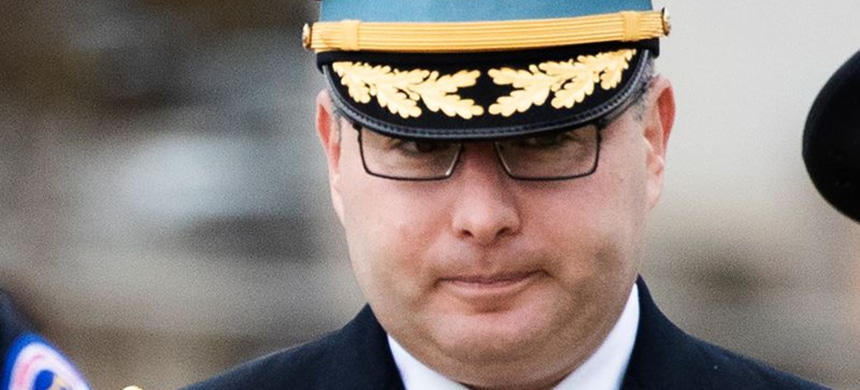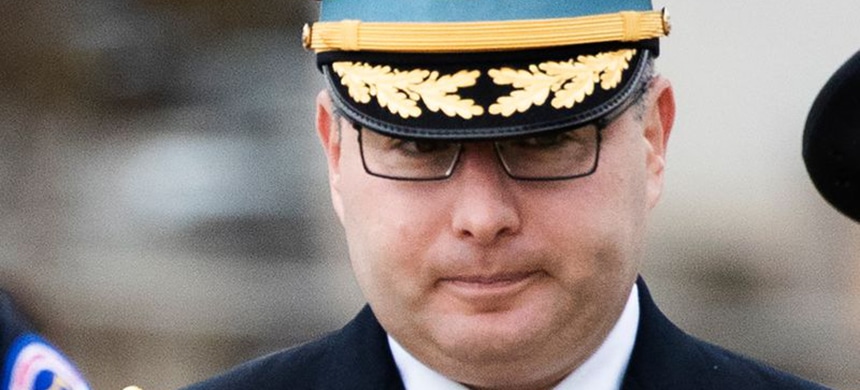
Lt. Col. Alexander Vindman, the former Director for European Affairs for the National Security Council, has filed a federal lawsuit alleging violations of his civil rights by Donald Trump, Jr.; attorney and Trump advisor Rudy Giuliani; former Deputy White House Communications Director Julia Hahn; and former White House Director of Social Media and Deputy Chief of Staff for Communications Daniel Scavino, Jr. He alleges a “conspiracy” to intimidate him and to retaliate against him as a witness against Donald Trump during his first impeachment proceedings. It claims that this conspiracy has left left “a stain on our democracy.” The lawsuit is novel and would create new law, if successful. However, after reading the filing, I remain skeptical of the legal basis for the action.
The complaint alleges that the defendants sought to “obstruct a constitutional proceeding by intimidating and retaliating against a key witness.” The complaint alleges two counts: a conspiracy in violation of 42 USC. § 1985(1) and a conspiracy in violation of 42 USC. § 1985(2). It seeks an order from the court to “permanently enjoin” the defendants from violating said laws again despite the fact that they are now private citizens. It also seeks nominal, compensatory, consequential, and punitive damages; and attorneys’ fees and costs.
It alleges:
In late 2019 and early 2020, President Trump and his allies—including members of his White House staff, members of his family and personal legal team, and at least one on-air personality employed by an allied media outlet—engaged in an intentional, concerted campaign of unlawful intimidation and retaliation against a sitting Director of the National Security Council and decorated military officer, Lieutenant Colonel Alexander Vindman, to prevent him from and then punish him for testifying truthfully before Congress during impeachment proceedings against President Trump. This campaign of intimidation and retaliation has had severe and deeply personal ramifications for Lt. Col. Vindman. It also left a stain on our democracy.
Much is already known about Vindman’s objections to what he heard in the call between Trump and the Ukrainian president. He alleges that, after he made his objections known, he became the target of an unrelenting media campaign attacking his honesty and even his loyalty:
The attacks on Lt. Col. Vindman did not simply happen by accident or coincidence, nor were they the result of normal politics or modern newscycles. Rather, the coordinated campaign was the result of a common understanding and agreement among and between President Trump, Defendants, and others comprising a close group of aides and associates inside and outside of the White House, to target Lt. Col. Vindman in a specific way for the specific purpose of intimidation and retaliation. The coordination and agreement on purpose and strategy is exactly what made this unlawful campaign against Lt. Col. Vindman so damaging.
The lawsuit says the campaign was “designed to inflict maximum damage by creating and spreading disinformation that they knew would be picked up and amplified by anchors at Fox News, other right-wing media outlets, and across social media — all while Lt. Col. Vindman’s active duty status prevented him from effectively defending himself.”
There clearly was a campaign to discredit Vindman. During the impeachment, I criticized those who went after the witnesses, including Vindman, and I specifically objected to later personnel changes related to Vindman. However, Vindman did not challenge the legality of those moves. He is challenging the media campaign and a host of individuals who are not named as parties.
Moreover, the lawsuit (if it makes it past a motion to dismiss) could expose all of the parties, including Vindman, to discovery on their communications related to the media and Congress. That could trigger some difficult privilege and confidentiality fights.
The question is whether that is political speech or an actual violation of federal law. In defending Trump, his staff and allies challenged the credibility, the motivations, and the interpretation of his accusers. Vindman says that this cannot be treated as pure politics:
Whatever one thinks of the merits of the underlying impeachment, purposefully attacking witnesses for participating in an official proceeding and telling the truth cannot be dismissed as politics as usual and cannot be tolerated in a nation built on the rule of law. However toxic our politics may have become, this kind of unlawful conduct must not be accepted as “normal” in any healthy democracy.
He repeatedly accuses Fox News of being part of this conspiracy against him. (For full disclosure, I am a legal analyst on Fox News). He alleges “close coordination between Fox News and the Trump Administration,” including a “private meeting” between then-Attorney General Bill Barr and Rupert Murdoch in October 2019. It goes on to claim the “Trump Administration’s relationship with Fox News was unprecedented in American history.”
The problem with the complaint is that it would require the court to delve into political disputes between Congress and the White House. What Vindman calls “false claims” can be matters of opinion and protected as political speech. Indeed, Vindman himself has been criticized for suggesting that some viewpoints should be punished. He was attacked on some conservative sites when he suggested that a trailer Carlson posted for his new documentary, “Patriot Purge,” could be the grounds for sanctions. He called Carlson an “anarchist” and an “arsonist” and“How is this different than yelling fire in a crowded theater? Carlson is attempting to incite a riotous mob. He should be censured. I’d like to hear the arguments for/against this being protected speech.” Since he is stating that Carlson is an anarchist and an arsonist, the question appears rather rhetorical.
He is an anarchist; an arsonist of American democracy. How is this different than yelling fire in a crowded theater? Carlson is attempting to incite a riotous mob. He should be censured. I’d like to hear the arguments for/against this being protected speech. https://t.co/xHTaxXo2p2
— Alexander S. Vindman (@AVindman) October 28, 2021
The inclusion of private parties in the lawsuit magnify the constitutional concerns over free speech. Vindman does not sue former President Trump while detailing how these individuals were clearly acting with his knowledge (citing Michael Cohen, Trump’s former lawyer and now Trump’s vehement enemy). Consider this passage on Trump Jr.:
Trump Jr. has at all relevant times been in close and continuing communication with President Trump. But beyond any father-son relationship, Trump Jr. and his father coordinated their public messaging on matters involving Trump’s presidency, businesses, and political and personal advancement. Steve Bannon has observed that Trump Jr. does not take any action without his father’s approval. Michael Cohen, one of President Trump’s former personal attorneys, testified under oath that he “absolutely” agreed with Bannon’s assessment of the relationship between President Trump and Trump Jr., and further that Trump “would never let Don [Jr] do” anything important on his own. Instead, Trump Jr. acts only with President Trump’s guidance and approval.
Donald Trump Jr. was a private party defending his father against accusers. Vindman is a public figure who notably is not suing for defamation. Rather, he wants a court to allow him to sue Trump Jr. for violating his civil rights for statements that Trump made as private person speaking out on a matter of great public interest. That could make any private party or commentators subject to such a lawsuit as intimidating or unfair. Where would the court draw the line?
Indeed, the complaint reads at points like a cathartic denouncing of anyone who criticized Vindman, including media figures like Laura Ingraham who is described as the “crisis communications consigliere” for President Trump. It alleges regular communications between such media figures and the White House. Is a court really going to allow discovery on such contacts?
The Biden Administration works in close communications with allies in the media, particularly on CNN and MSNBC. Indeed, the White House Communications Office is tasked with framing issues and controversies in the media. It does so by keeping sympathetic reporters updated and informed. Indeed, the Biden Administration has had a level of cooperation with the media that may be unprecedented in killing possible scandals.
The complaint also details the “revolving door” between the Administration and the media. Yet, the Biden and Obama Administration has shown the same revolving door, including White House Press Secretary Jen Psaki. Indeed, the current controversy over Hunter Biden has placed some current officials in a curious position in responding to new developments due to their prior roles.
Much of the complaint is striking back at Ingraham and others for things that they said about Vindman. Yet, again, while claiming that Ingraham and others smeared him with false accusations, Vindman is not suing for defamation. This includes characterizing his actions on the call as akin to “espionage.” The problem is that many commentators on left have leveled the same type of hyperbolic attacks on Trump and his associates. That has been treated as an exercise in free speech. Indeed, just this week, Psaki suggested that Sen. Josh Hawley of being an effective agent for Russia and seemed to question his loyalty to the country for opposing Ukrainian entry into NATO.
The lawsuit reads more like a defamation complaint and even notes “Neither Fox News nor Ingraham ever retracted the false allegations, despite Lt. Col. Vindman’s attorney’s written request that they do so because the allegations were false and defamatory.” Yet, after a long defense of Vindman against personal attacks, the complaint pivots from defamation to the actual claim of civil right violations:
As described more fully above, Defendants and their conspirators engaged in a concerted effort to portray Lt. Col. Vindman as disloyal to the United States, as a spy for another country, and as a politically motivated saboteur. They further agreed and conspired to falsely accuse him of leaking classified information and perjury. They did so for the purpose of both deterring him from testifying in the impeachment proceedings and other proceedings implicating President Trump, and to retaliate against him for doing so. In the process, they knowingly destroyed his ability to continue his career in national security and foreign affairs. They also intended to send a clear message that a similar fate would await anyone else who testified truthfully against Trump.
Putting aside a later defamation action (though the statute of limitations is a concern), the filing could present an interesting question of whether the statute can be used to chill or curtail free speech. That was the concern that led the Supreme Court to curtail defamation actions. Vindman was a public official and is now a public figure. He is subject to the higher standard of proof in New York Times v. Sullivan.
The Supreme Court ruled that tort law could not be used to overcome First Amendment protections for free speech or the free press. The Court sought to create “breathing space” for the media by articulating that standard that now applies to both public officials and public figures. As such, public officials and public figures must show either actual knowledge of its falsity or a reckless disregard of the truth.
This is a matter of public concern and political debate. Much of Vindman’s complaint is an attack on non-parties and networks for his treatment in the media. As someone who defended him from some of these attacks, I understand his anger and frustration. However, this lawsuit asks a court to drive deeply into political speech concerning one of the most important scandals in our history. I cannot imagine that many judges who would relish such an invitation.
Here is the complaint: Vindman v. Trump Jr., et al.
Reprinted with permission from JonathanTurley.org.

